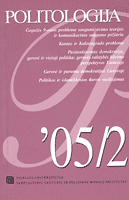Akademinis mokslas ir demokratija
Academic Science and Democracy
Author(s): Zenonas NorkusSubject(s): Politics / Political Sciences
Published by: Vilniaus universiteto leidykla & VU Tarptautinių santykių ir politikos mokslų institutas
Keywords: philosophy of science policy; academic populism; academic liberalism; academic republicanism; Steve Fuller; reform of science in Lithuania
Summary/Abstract: The article pursues the task to build the connection between the ongoing discussion how to reform the academic science in Lithuania and the recent work in the science and technology science inspired by the crisis of the "big science" which has reached the limits of growth during the last decades of the 20th century as predicted by Derek Solla de Price in the 1950s. The article subjects to critical and comparative analysis three philosophies of science policy - academic populism, academic liberalism, and academic republicanism. (...) Is Matthew effect a failure of autonomous science comparable to "failures of market" discussed in the economics and political philosophy? The author argues against the unconditional assessment of the Matthew effect in this way. On his opinion, while assessing the Matthew effect and other phenomena incompatible with the essentially contested ideals of democracy the question about the consequences for the progress of science has the lexicographic primacy. What is good for science can be not so good for scientists, and even the Matthew effect under certain conditions can be functional for the goals of science. Utopian aspects of Fuller's academic republicanism shared with the republicanism as general political philosophy are disclosed too, drawing on the insights into the workings of real democratic processes provided by the public choice theory. The article concludes by presenting for discussion a few Fuller-inspired proposals how to proceed reforming science in Lithuania. These proposals include the privatization of the state sponsored research institutes doing the applied research, the reorientation of the state agencies from the grant-based to the prize-based funding of the science, the redirection of the state funds from the basic research towards the development of the informational infrastructure necessary to make the knowledge already produced by the world science locally accessible, and the participation of the "dilettante" members of the scientific community in the evaluation of the research institutions in the "alien" areas.
Journal: Politologija
- Issue Year: 2001
- Issue No: 4 (24)
- Page Range: 2-51
- Page Count: 50
- Language: Lithuanian

